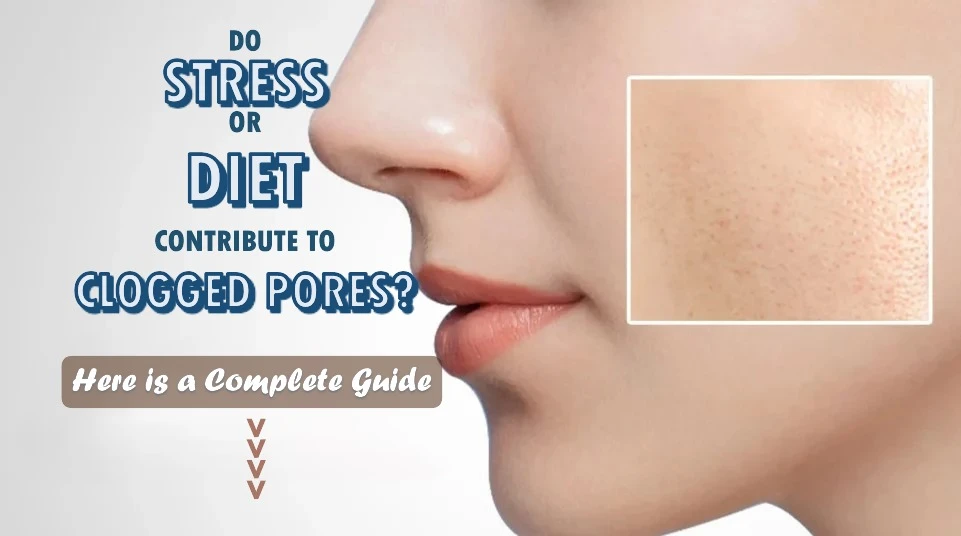Do Stress or Diet Contribute to Clogged Pores? Exploring the Hidden Triggers Behind Breakouts
Do Stress or Diet Contribute to Clogged Pores? Exploring the Hidden Triggers Behind Breakouts
Clogged pores, which often appear as blackheads, whiteheads, or bumpy skin texture, can be frustrating for anyone striving for clearer skin. While excess oil and dead skin cells are direct causes of clogged pores, many people wonder if lifestyle factors like stress and diet also play a role. The answer? They can—and here’s how.
How Do Pores Get Clogged?
Pores can become blocked when too much sebum (oil) mixes with dead skin cells and debris, trapping them inside. This blockage may also create an environment where acne-causing bacteria thrive, leading to breakouts.
But why do some people experience clogged pores more than others? Beyond genetics and skincare habits, stress and diet can be hidden triggers.
The Link Between Stress and Clogged Pores
Stress itself doesn’t directly fill your pores with oil and debris, but it sets off a chain reaction in your body that can make clogged pores more likely.
When you’re stressed, your body produces more cortisol—a hormone that can increase oil production in your sebaceous glands. This excess oil can clog pores, especially if your skin already tends to be oily or acne-prone. Stress can also:
-
Make existing breakouts worse by prolonging inflammation.
-
Disrupt sleep, which may affect skin renewal and healing.
-
Encourage habits like touching your face more often, which can transfer dirt and bacteria.
Even if stress doesn’t cause acne overnight, it can tip the balance, making skin oilier and more prone to clogged pores over time.
Can Diet Lead to Clogged Pores?
The relationship between diet and skin health is still being studied, but evidence suggests that certain foods can contribute to breakouts and clogged pores, especially in those who are already prone to acne.
High-glycemic foods—such as sugary snacks, white bread, and sweetened drinks—can spike blood sugar levels. This spike triggers a rise in insulin, which may increase oil production and lead to more clogged pores.
Dairy products, especially skim milk, have also been linked to acne in some studies. The hormones and bioactive molecules in milk could influence your body’s own hormone levels, potentially increasing oil production.
Processed foods and unhealthy fats can contribute to inflammation, making clogged pores and acne more noticeable.
However, it’s important to remember that not everyone reacts to food the same way. Some people might see a clear connection between their diet and skin changes, while others may not notice a difference.
Tips to Reduce Stress- and Diet-Related Clogged Pores
-
Practice stress management: Activities like meditation, yoga, exercise, and deep breathing can help keep cortisol levels balanced.
-
Focus on a balanced diet: Choose whole foods, vegetables, fruits, and healthy fats. Limit sugary and highly processed foods if you notice they trigger breakouts.
-
Stay hydrated: Drinking enough water supports healthy skin renewal.
-
Follow a gentle skincare routine: Regular cleansing, exfoliation, and non-comedogenic products can help keep pores clear.
Final Thoughts
Stress and diet might not be the direct cause of clogged pores, but they can create the conditions that make breakouts and congestion more likely. By managing stress, eating balanced meals, and maintaining consistent skincare habits, you can reduce the risk of clogged pores and enjoy healthier, clearer skin. If you continue to struggle with frequent breakouts, consider consulting a dermatologist to uncover any underlying causes and find the best treatment plan for your skin.

Related Blog
What Causes Oily Skin and Can It Be Managed Naturally? Exploring Root Causes and Gentle Solutions
Aug 2, 2025 by Admin
General
What Are the Signs That You Have Sensitive Skin? Key Symptoms to Help You Identify This Delicate Skin Type
Aug 1, 2025 by Admin
General